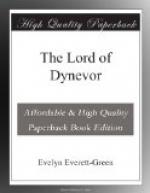Intensely patriotic as the girl had ever been, loving her country above all else, and throwing heart and soul into that country’s cause, she had yet learned a deep love and reverence for the family of the English king, amongst whom so many years of her young life had been spent. She was able to do full justice to the kindly and domestic side of the soldier king’s nature, and, whilst she regarded him as a foe to Wales, looked upon him personally as a friend and protector.
Edward’s gentleness and affection in his private life equalled his stern, unbending policy in matters of state. It was very tenderly and kindly that he led the girl to the private apartments of the queen; and when once Arthyn found herself face to face with one who had given to her more of mother love than any other being in the world, she flung herself into the arms opened to receive her, and out came the whole story which had brought her on this secret mission to Carnarvon.
“Sweet lady, O most gracious madam, listen and plead for me with the king. He is kind and good, and he knows what true love is. Lady, it is as a wedded wife I come to you, craving pardon for what I have done. But I ever hated that wicked Raoul Latimer, my country’s foe, and would have died rather than plight my troth to him. And when he came to us — he, my love, my life, he whom I loved long years ago when we met as boy and girl, and whom I have never forgotten — what could I do? How could I resist?
“And my father approved. He gave my hand in wedlock. And now I am come to pray your pardon for myself and for him whom I love. Oh, do not turn a deaf ear to me! As you have loved when you were young, pardon those who have done likewise.”
King and queen exchanged glances, half of amusement, half of astonishment, but there was no anger in either face. Raoul was no favourite in the royal circle, and his visible cowardice in the recent campaign had brought him into open disfavour with the lion-hearted Edward. He loved Arthyn dearly, and this proof of her independence of spirit, together with her artless confidence in his kindliness of heart, pleased him not a little. He had been forced during these past days to act a stern part towards many of the Welsh nobles who had been brought before him. He was glad enough, this thankless task accomplished, to allow the softer and more kindly side of his nature to assert itself. And perhaps the sympathetic glances of his son Alphonso, who had just entered the room, helped to settle his resolve that Arthyn at least should receive full and free forgiveness.
Eleanor had drawn her former playmate towards her, and was eagerly questioning her as to the name of him to whom her heart and hand were now given, and the answer sent a thrill of surprise through the whole company.
“It is one whom you all know, sweet Eleanor — Llewelyn, the son of Res Vychan, Lord of Dynevor. Thou knowest, Eleanor, how he came amongst us at Rhuddlan years agone now, and perchance thou sawest even then how we loved one another, albeit it was but the love of children. But we never have forgotten, and when he came to my father’s castle, wounded and weary and despairing after the disaster which robbed Wales of her last native prince, what could we do but receive and tend him? It was thus it came about, and love did the rest.”




